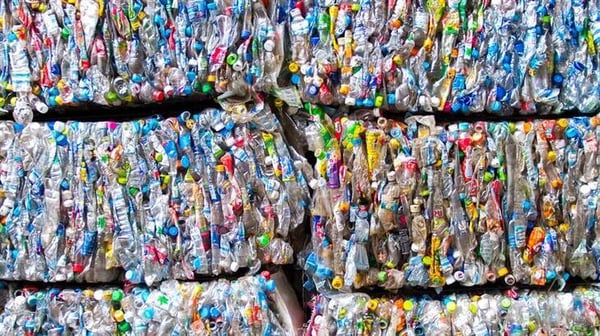Disclaimer: Views in this blog do not promote, and are not directly connected to any L&G product or service. Views are from a range of L&G investment professionals, may be specific to an author’s particular investment region or desk, and do not necessarily reflect the views of L&G. For investment professionals only.
Behind the Plastic Curtain: The treaty, the lobbyists, and the truth about recycling
From the corridors of negotiations at the United Nations to boardrooms across the world, a plastic curtain has descended. It conceals the true cost of plastic production and pollution behind a veil of sustainability rhetoric and recycled promises. Much like the warning of an iron curtain dividing Europe, today we face a new kind of partition: one that separates truth from spin, accountability from greenwashing.

From externality to systemic and material risk
What began as a convenience has metastasised into a structural liability, ecological, legal, and economic. While plastic remains critical for specific, high-performance uses, it is overused in low-value, high-leakage applications.
The production and mismanagement of plastic waste is driving nature change across our markets. The Organisation for Economic Co-operation and Development (OECD) projects global plastic waste will triple from 353 million tonnes in 2019 to over 1 billion tonnes by 2060 under current trends[1]. Marine plastic pollution alone costs up to $2.5 trillion annually, including losses to fisheries, tourism, and ecosystem services[2].
Investors, companies, and policymakers must confront a hard truth: the current plastic economy threatens planetary boundaries, fiscal prudence, and market stability. Solving the plastic problem requires coordination action across government and the private sector, from establishing collection and sorting facilities, designing recyclable products and supporting demand for recycled materials at a similar cost to virgin materials. To support this, we need legally binding global rules translated into domestic regulation.
Regulation: A moment of reckoning
Some governments are already moving on this topic, creating risk to companies in those markets that do nothing. For example:
California’s SB 54 mandates that 65% of single-use plastic packaging must be recyclable or compostable by 2032, with penalties up to $50,000 per day for non-compliance[3].
The EU’s Packaging and Packaging Waste Regulation (PPWR) establishes a new set of requirements that cover the entire packaging life cycle for all Members States, with penalties for non-compliance being “proportionate and dissuasive”[4].
Negotiators have reconvened this August to advance the Global Plastics Treaty (GPT). If ratified, the treaty would establish binding rules on plastic pollution across its full life cycle. These may include international obligations for virgin plastic reduction, circular design, and extended producer responsibility (EPR)[5].
The lobbying paradox: Public virtue, private obstruction
Lobbying has significantly intensified. A High Ambition Coalition of 60+ countries, including the UK, Rwanda, and the EU, supports binding rules. In contrast, countries like the US, Saudi Arabia, and China back voluntary national action plans[6].
Corporate lobbying has aligned behind these two groups. However, not everyone is being clear which camp they sit in…
Some companies publicly support circularity while funding trade groups opposing regulation. A 2024 InfluenceMap report revealed that petrochemical and packaging groups, including members of the American Chemistry Council and Plastics Europe, have lobbied to weaken treaty provisions[7]. This includes opposing mandatory reduction targets and transparency standards.
This misalignment, lack of transparency, or failure to appropriately file reports raises governance and disclosure risks. Whilst we need policymakers to strengthen their regulatory teeth here, we have already seen companies, like FirstEnergy[8], face significant fines in related cases where lobbying played a role in wider violations. Companies claiming environmental leadership while funding obstructionist lobbying increase their exposure to litigation, regulatory penalties, and public backlash. This is no longer reputational risk alone — it's material financial risk.
Legal exposure: Recycling - a strategic mirage
Recycling has long served as a convenient narrative for companies seeking to demonstrate environmental responsibility. While recycling remains a necessary part of the solution, it is increasingly clear that it cannot shoulder the burden alone — and in many cases, it never truly did.
Much of what is marketed as “recyclable”, such as multilayer packaging, coloured plastics, or items contaminated by food, is not economically or technically viable to recycle at scale. The result is a widening gap between what is claimed to be and what is actually recycled.
Globally, only 9% of plastic waste is recycled, and in the U.S., the figure drops below 6%[9]. This disconnect is no longer just a sustainability issue, it is a legal and reputational risk. Regulators and litigators are increasingly scrutinising environmental claims, and companies that overstate recyclability or underdeliver on circularity commitments may face allegations of greenwashing or consumer deception. If found to be true, companies face rather more than a slap on the wrist. For example:
ExxonMobil was sued in 2023 by the California Attorney General, alleging decades of misleading the public about the recyclability of plastics. The suit parallels climate fraud litigation and could result in damages exceeding $1 billion[10].
In the same year in a lawsuit filed in California, Nestlé, Coca-Cola, and PepsiCo were named among defendants for false advertising on recyclability claims. If found liable, financial exposure could range between $50 million to $200 million based on previous class-action greenwashing settlements[11].
The Center for Climate Integrity estimates that plastic-related misrepresentation cases could generate over $20 billion in liability globally over the next decade, as the legal strategies used against Big Tobacco are applied to plastic producers and brand owners[12].
Shareholder pressure
Shareholders have also been supporting increasing investor pressure on this matter. For example, both Mondelez International and Kraft Heinz have received a number of shareholder resolutions on disclosure and setting targets on plastic reduction. This year, a resolution was filed requesting a report detailing the factual basis for all recycled content claims on plastic packaging, assessing reputational, financial and operational risks of misleading claims[13], something that we supported.
We also joined over 100 companies and investors in signing the Business Coalition for a Global Plastics Treaty, calling for mandatory rules on plastic reduction, reuse, and transparency[14]. We, and other forward looking companies, also supported the UK Government’s business statement that is calling for an ambitious and effective treaty.
Conclusion
The Global Plastics Treaty is not merely a regulatory exercise, it is an economic inflection point. One that will test whether capital markets can evolve in line with planetary boundaries.
We must move beyond symbolic gestures and confront the structural overuse of plastics, particularly in low-value, high-leakage applications. The cost of alignment is measurable. But the cost of denial, in litigation, regulatory exclusion, stranded assets, and reputational damage, is accelerating.
What lies behind the plastic curtain is no longer obscured.
In my next blog, I will discuss solutions that corporate can take to reduce their risk, moving from rhetoric to resilience.
Source: L&G, August 2025. All views expressed are of L&G at the date of publication.
Key risks
Assumptions, opinions, and estimates are provided for illustrative purposes only. There is no guarantee that any forecasts made will come to pass.
[1] OECD, “Global Plastics Outlook: Policy Scenarios to 2060,” June 2022.
[2] Dalberg Advisors & WWF, “Valuing Plastic,” 2019.
[3] State of California, SB 54 Plastic Pollution Prevention and Packaging Producer Responsibility Act, 2022.
[4] European Commission - Regulation (EU) 2025/40- https://eur-lex.europa.eu/legal-content/EN/TXT/?uri=OJ:L_202500040&pk_campaign=todays_OJ&pk_source=EUR-Lex&pk_medium=X&pk_content=Environment&pk_keyword=Regulation
[5] United Nations Environment Programme (UNEP), “Global Plastics Treaty Negotiation Mandate,” 2022.
[6] Earth Negotiations Bulletin, “INC-3 Summary,” 2023.
[7] InfluenceMap, “Corporate Influence on the Global Plastics Treaty,” 2024.
[8] https://www.sec.gov/enforcement-litigation/administrative-proceedings/33-11302-s
[9] OECD, “Global Plastics Outlook,” 2022; U.S. EPA, “Facts and Figures about Materials, Waste and Recycling,” 2022.
[10] California Attorney General, “Complaint against ExxonMobil,” 2023.
[11] Earth Island Institute v. BlueTriton Brands et al., U.S. District Court, Northern District of California, 2023.
[12] Center for Climate Integrity, “The Fraud of Plastic Recycling,” 2023.
[13] https://www.lastbeachcleanup.org/
[14] WWF & Business Coalition for a Global Plastics Treaty, “Supporters List,” 2023
Recommended content for you
Learn more about our business
We are one of the world's largest asset managers, with capabilities across asset classes to meet our clients' objectives and a longstanding commitment to responsible investing.

